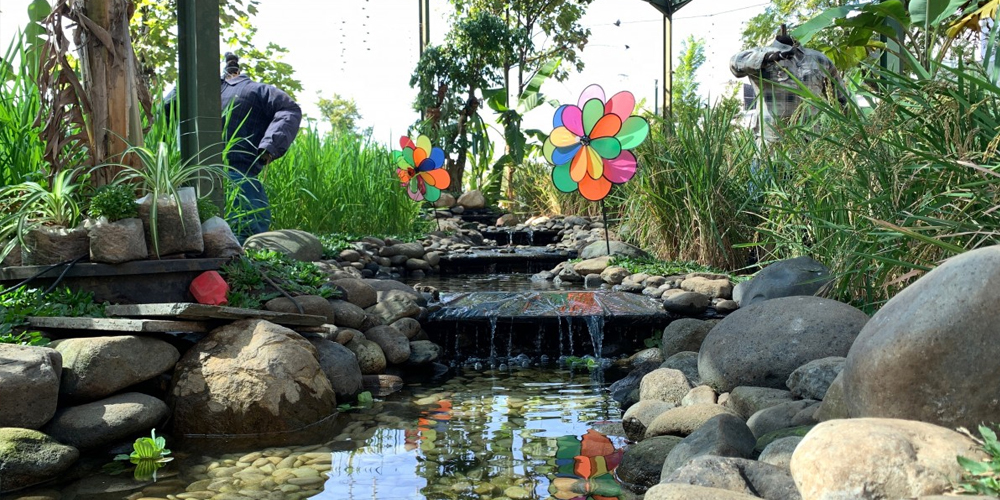We have all fantasized about having a gorgeous water garden in our backyard or strategically displayed in our living room. It all looks serene and peaceful after it has been built and aquatic life has been added, increasing the value of a space. However, the peace and tranquility would not last long if you are not aware of the proper care procedure for the fish pond and the aquatic life that lives in it.
A Fish Pond is a Type of Ecosystem
In reality, keeping a healthy fish pond is significantly more complex than constructing a fish pond or water garden. You can not just throw some fish and plants in a pond and forget about it. A fish pond is a living, breathing ecosystem and must be maintained at all times. You must strive for a healthy fish pond, not just for the beautiful ambiance it provides.
So, if you are new to the world of owning a water garden or fish pond, Koi Komponion is here to provide you with the pro-tips that can help you achieve a healthy and high-quality fish pond.
Maintain a Healthy Fish Population
It would be best to take caution when allowing fish into your pond. Overpopulation of fish can result in various problems, including imbalanced water quality, a lack of food sources, stunted fish, and the accumulation of organic material, eventually leading to excessive growth of weeds and algae.
The general rule is that no more than 10 inches of fish should be kept in every 100 gallons of water. It is important to remember that fish and other living organisms in a water garden require space to grow. If you overcrowd your pond with fish, they will not have enough room to grow to their full size.
However, by keeping an appropriate number of fish in a pond, you can easily maintain water quality and have a healthy pond.
Clean Your Fish Pond Regularly
Cleaning a fish pond is a must if you want a healthy pond. Falling leaves from nearby trees may drift over and fall into the pond, which happens to be one of the problematic aspects of water gardens. Decaying leaves tend to release harmful fumes, causing harm to the pond’s healthy ecological balance if left to rot.
Other reasons your pond should be cleaned regularly include fish waste and uneaten fish food. Unfortunately, these can develop a build-up and sediment, which will promote the growth of harmful algae and endanger the lives of all pond species.
Avoid Over Feeding Your Fish
Do not overfeed your fish if you don’t want your pond to fill up with hazardous chemicals and decaying material. When you feed your fish in excess, they produce more waste than they would normally. Due to this quick increase in waste, ammonia and nitrates are produced, which are hazardous to both the fish and aquatic vegetation.
Food that is not consumed settles to the pond’s bottom and begins to decay. This creates a toxic atmosphere in the fish pond, endangering the lives of everyone that inhabits it.
Maintain a Proper Balance of Aquatic Plants
Cover 40 to 60 percent of your pond’s surface with plants for a perfect natural balance. Aquatic plants help remove extra nutrients from the water, control unexpected algae blooms, and provide proper cover for fish and other species. However, overcrowding your fish pond with aquatic plants can unbalance the pond’s ecosystem.
During the day, plants create oxygen and raise the pH of the water. However, at night, plants respire, withdrawing oxygen and adding carbon dioxide, reducing the pH. This cycle can be hampered by an overabundance of plants, resulting in a disrupted ecosystem and fish kill.
Control the Growth of Algae
Algae contribute to the overall balance of a fish pond by producing oxygen and food for the animals that live there. Removing all of them from a pond is not suggested. Keep a watchful eye on their growth because algae gloom can be a huge and serious problem, causing fish kill and removing oxygen from the pond water.
There are two methods for removing excess algae. One way is to increase the number of aquatic plants that can compete for nutrients with algae. And two, by physically removing entire colonies from the surface using a rake.
Maintain an Appropriate Water Level
Maintaining the correct water level is critical for a healthy fish pond. You may observe a drop in the water level, particularly during hot weather, due to increased evaporation. Excessive evaporation also reduces oxygen levels in the water, which can be dangerous to fish and plants.
To have a well-maintained fish pond with a consistent water level, you must refill the pond with clean water. Do not use tap water since it includes chlorine, a highly toxic element for fish.
Have a Good Filtration System for Your Pond
Having a sound filtration system for your pond is very important. Most pond filters are designed for ideal circumstances, and if those are exceeded, a larger filter is needed. You can always get a bigger filter to better suit the needs and requirements of your pond.
Maintain the Right Water Temperature
Ice can build up on the pond’s surface during cold weather, reducing the water temperature. Install a heating system to keep the water temperature stable so that the pond’s inhabitants do not suffer.
During hot weather, water in the pond might heat up, reducing oxygen in the water. If you see your fish gasping for air at the surface of the water, use an aerator.
It is All Worth It
Following these tips and prioritizing the maintenance of your fish pond will make for a healthy fish pond that looks terrific as well. It does, without a doubt, require a bit more effort, but it is worth it when it adds charm and value to your space. If you wish to have a pond in your Tampa Bay home, office, or club, Koi Kompanion can definitely create a stunning fish pond for you.




